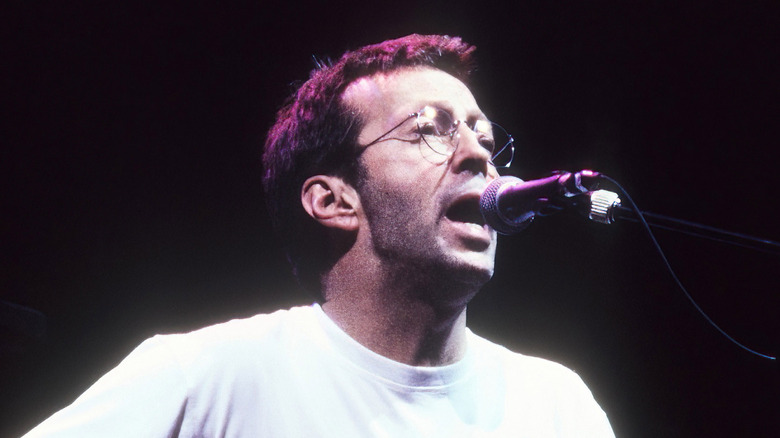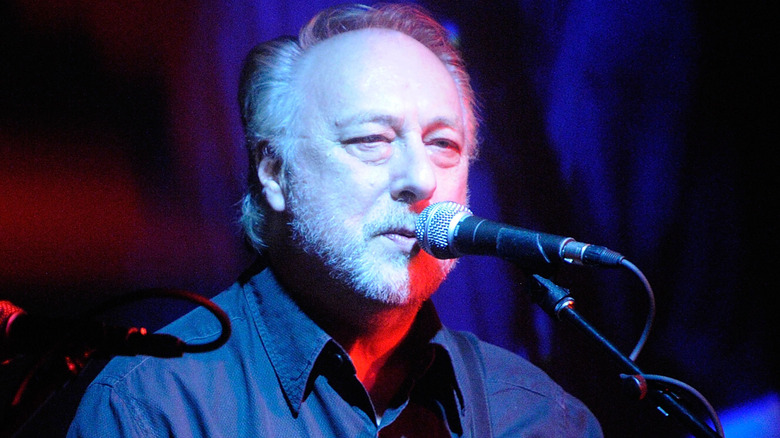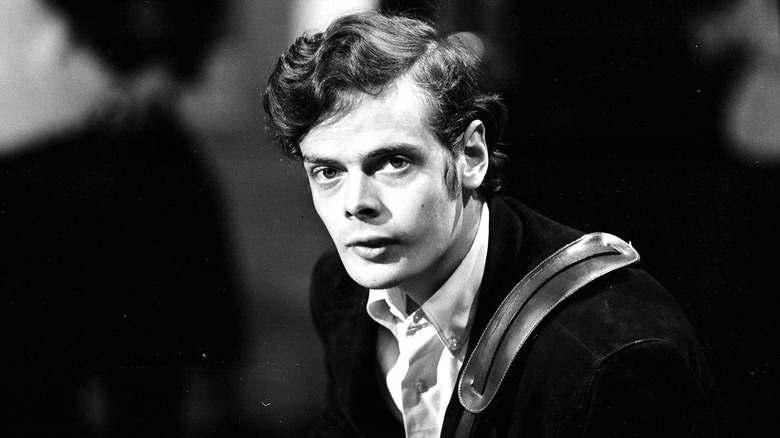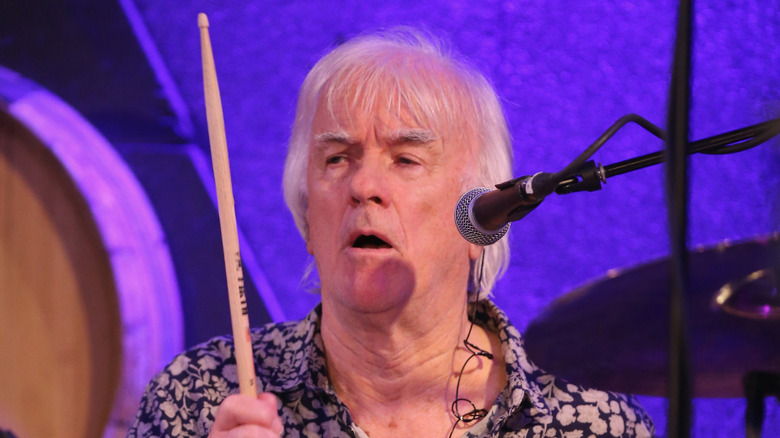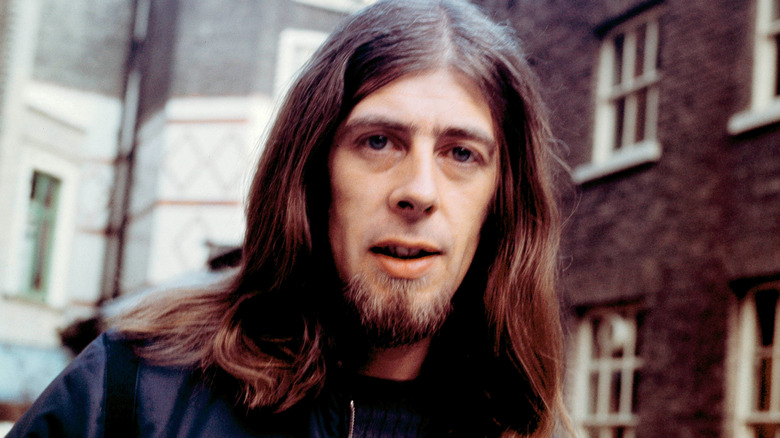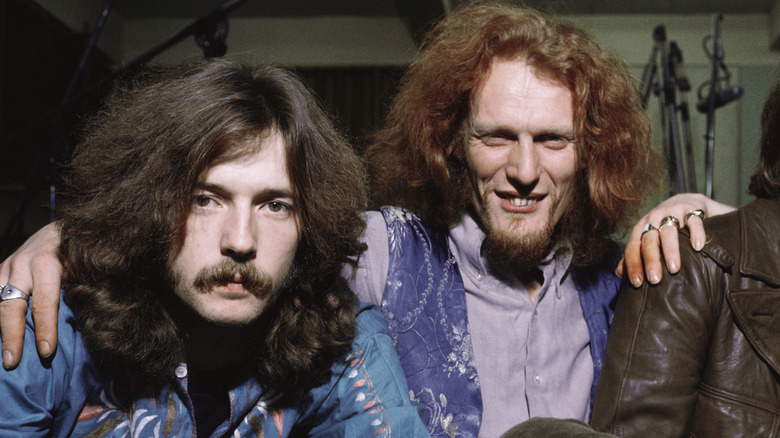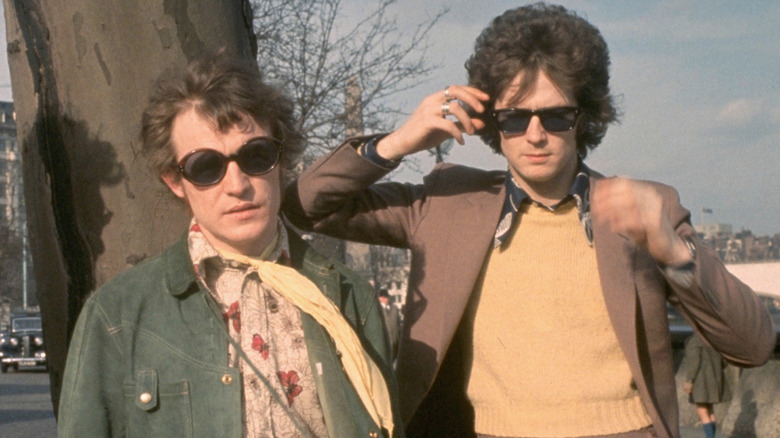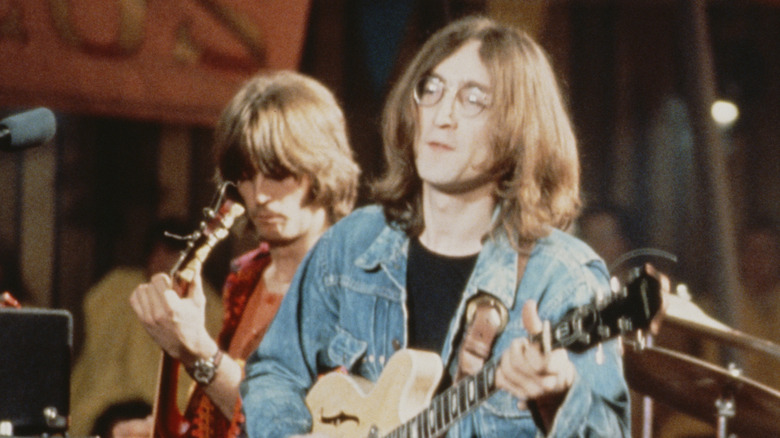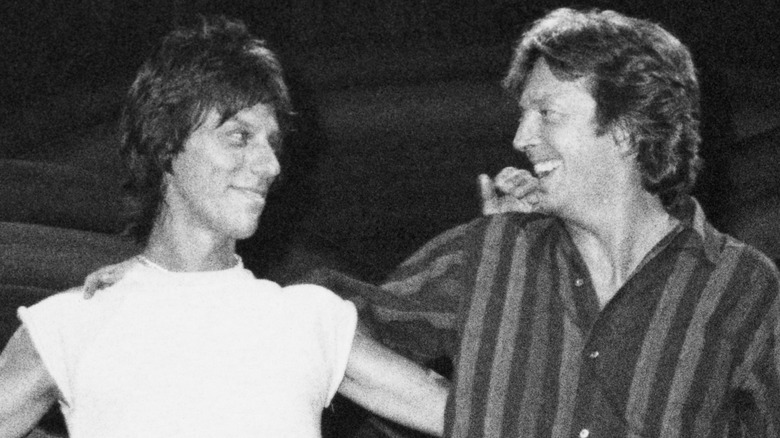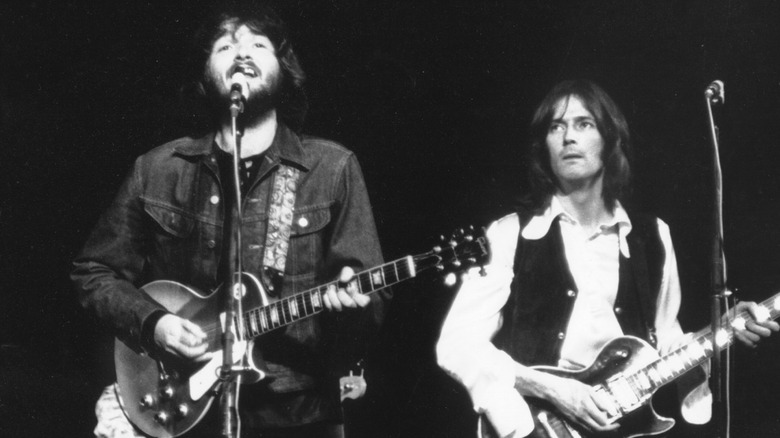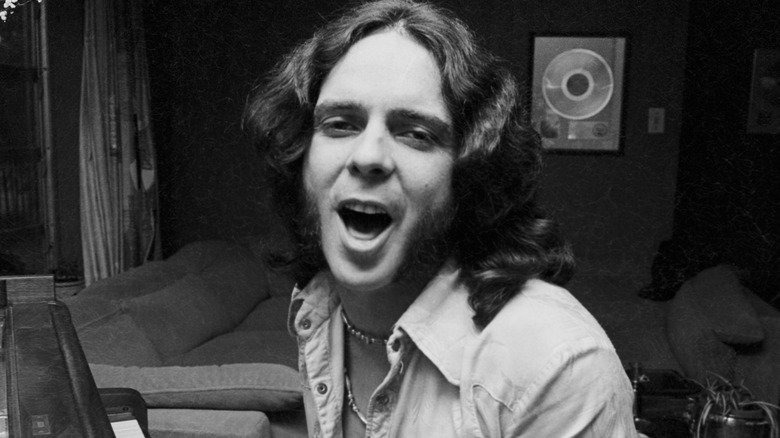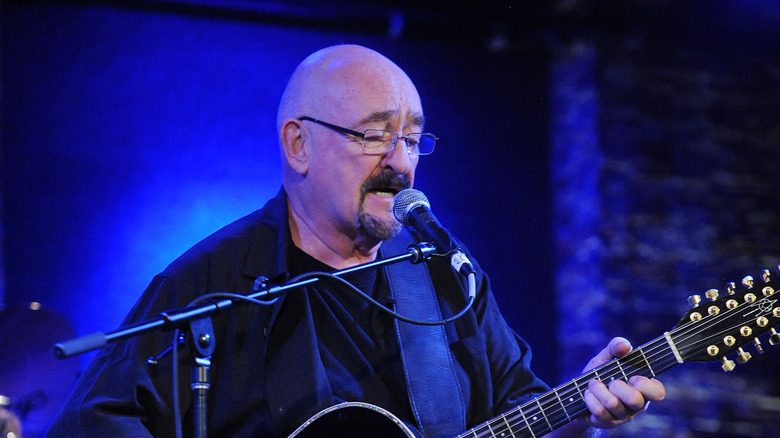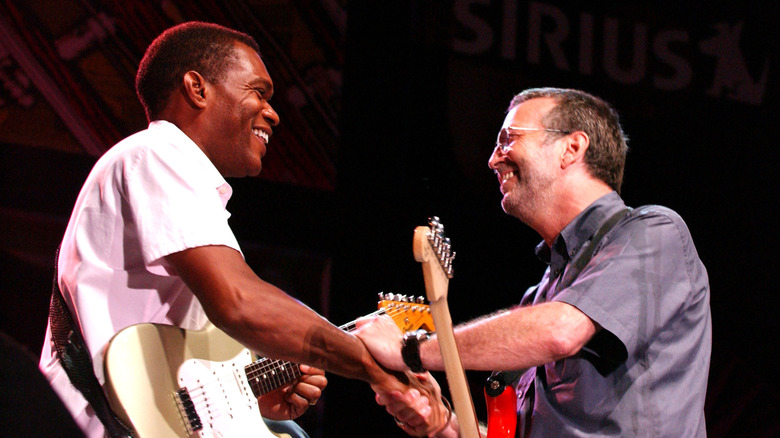Eric Clapton's Former Bandmates Have A Lot To Say About Him
Eric Clapton is objectively one of rock music's all-time greats. Universally regarded by critics and fans as one of the best classic rock and electric guitarists to ever pick up an instrument, he's shaped the music history of the last half of the 20th century. Also a singer and songwriter, his career has spanned decades and is especially notable for its high volume of collaboration. While Clapton's solo career took off in the 1970s, he obviously loves to just be a guitarist in a band, surrounded by other luminaries. Among the collectives and supergroups with whom he spent a few years and recorded at least one album are the Yardbirds, Cream, Blind Faith, and Derek and the Dominoes. And then there are all the short stints and team-ups with legends like blues greats, and he even factors into the story of the Beatles, too.
Such a long career inevitably becomes a colorful and controversial history, and the life of Eric Clapton has been a tragic one as well as one of artistic significance. A lot of musicians loathe Eric Clapton, particularly owing to his charged political statements. Many others treasure the time they got to spend making music with the world-class guitarist. Here are some of the times when Eric Clapton's former bandmates went on record to discuss the complicated, talented, and baffling musician.
Chris Dreja
Young British guitarists grew fascinated with American-style blues in the early 1960s. The more virtuosic formed bands that mixed the blues with electric rock n' roll, and one of the earliest and most pioneering of the form were the Yardbirds. Chris Dreja joined an early incarnation of the band as their rhythm guitarist, and he welcomed the change when Anthony "Top" Topham left the band and new lead guitarist Eric Clapton joined.
Almost immediately, Dreja was in awe of his new bandmate's raw power, work ethic, and star quality. "Clapton used to rehearse phrases for a weekend or a week at a time," Dreja told Classic Rock Radio in 2005. "He was very much a journeyman. But he did have a charisma, no doubt about it. He was very single-minded and used to recreate himself fashion-wise and all sorts of things almost on a monthly basis." The guitarists also connected over similar pasts. "I had a close kinship with Eric during his time with the band, as our art-school background was pretty much the same, and we had a similar sense of bizarre humor," Dreja recalled to Vintage Guitar in 2009. "He introduced me to plenty of blues, too, and taught me a lot."
Paul Samwell-Smith
Well before the Yardbirds were even a concept, Paul Samwell-Smith was part of a British band that specialized in playing in the Memphis blues style. At a show, he was approached by a spectator who would soon become his collaborator in one of the earliest lineups of the Yardbirds, but only after he accepted a recommendation to switch instruments. "Eric was in the audience — and came up to me in the interval and said, 'Do me a favor — don't try and play guitar'; he thought it was dreadful, and I think he was right," Samwell-Smith told Let It Rock in 2022 of his first encounter with Eric Clapton. "Then, I picked up the bass."
Samwell-Smith was the bassist for the Yardbirds when Clapton joined the group in 1963. Though he later moved away from playing in bands and into a producer role, he still gets a lot of attention for his stint with the group. And according to the bassist, the Yardbirds were only regarded as an excellent band only because of their guitarists. "Eric Clapton, Jeff Beck and Jimmy Page — I think that's the main reason; and because the Yardbirds remain famous — they are having something of a resurgence of interest, and people are taking them quite seriously now," Samwell-Smith told Let It Rock.
Jim McCarty
Eric Clapton was a member of the Yardbirds for just two years, from 1963 to 1965. The real reason Clapton left the band? He wanted to pursue what he thought was a more pure and noble musical goal. The Yardbirds scored one of its few Top 10 hits in the U.S. and the U.K. in 1965 with "For Your Love," and success with such a radio-friendly, hook-filled song drove Clapton away. "That was part of it," Jim McCarty, the Yardbirds' drummer during Clapton's brief tenure, told the Arizona Republic in 2018. "I would say quite a big part of it. He didn't like the way we were going into a pop thing rather than a blues thing. ... [H]e didn't really want to be part of the team. I think he was destined to be his own guy."
Clapton's exit left an opening for Jeff Beck to become a member of the iconic band, and all of that was just fine with McCarty, who didn't really like pursuing the guitarist's whims or dealing with his attitude. "Eric had these R&B mod songs he wanted us to do. Him leaving was a relief," McCarthy told The Guardian in 2007. "Eric would be sitting in the van not talking to anyone. You'd think he's so moody, he's such a pain, we're fed up with this."
John Mayall
Inducted into the historically controversial Rock & Roll Hall of Fame in 2024, John Mayall was an architect of classic rock. Hailed as "the godfather of British Blues," the curator and leader of John Mayall & the Bluesbreakers collaborated with and fermented the talent of numerous blues-loving stars to be, including Mick Fleetwood, Peter Green, and John McVie of Fleetwood Mac, and Eric Clapton. The latter, seeking an outlet to play very serious, very heavy, and very authentic blues (but with an electric kick), joined Mayall's collective in 1965, immediately after departing the Yardbirds.
Mayall knew Clapton and his work because they played the same clubs, and before they joined forces, he wasn't all that impressed. "He wasn't that remarkable, but you know, obviously he was the only one you would look for if you were going to hear the Yardbirds at that time and if you were a blues lover," Mayall said in a 1991 interview.
But then Clapton got better, quickly, under Mayall's tutelage. "It was just remarkable really how quickly Eric progressed, and that was probably because he had no one to play with, so he put a lot of time in listening to records and getting his foundations right." Clapton also lived in an extra room in Mayall's house for a spell. "That enabled him to have free access to my huge at that time record collection which was a pretty hefty blues archive," Mayall said.
Ginger Baker
While Eric Clapton was still performing with John Mayall's Bluesbreakers, Ginger Baker, an accomplished drummer who'd played with many bands, asked the guitarist if he wanted to form a group where they could pursue an ambitious, loud, and heavy jazz-blues-rock fusion. Along with Jack Bruce on bass, per Clapton's request, the power trio that thought very highly of itself named the project Cream.
Cream ended its highly acclaimed two-year life in 1968 at Clapton's insistence. Baker needed to drink heavily to get through recording sessions. "In the end I couldn't take it anymore, and Eric was the same," Baker told music journalist Jim Clash in 1997 (via Forbes). "Looking back on the last tour, Eric came to me and said, 'I'm fed up with this.' And I said, 'So am I.' And that was it. Finished," Baker explained elsewhere. Years later, after Baker found himself in dire financial straits, he asked Clapton to reunite Cream, just to earn some money. "He said he didn't want to do it just because I was broke," Baker said. "This really hurt me at the time, but it was also absolutely true."
Jack Bruce
Cream was the toast of the British blues scene and a rock radio hit maker, and the three-man group with a very big sound influenced a generation of hard rock. But each member of Cream, including creator Eric Clapton, seemed to have their own idea of how the band should've functioned, dooming it to an early demise. "I think Eric thought he was going to have this little blues trio and he would be sort of like Buddy Guy standing out front," bassist Jack Bruce theorized to Guitarist in 2012 (via Guitar Player), adding that he learned from his bandmate. "Eric was really into the blues and he knew a lot of stuff that I didn't know."
Both in the moment and in retrospect, Bruce couldn't deny Clapton's prodigious talent. "He was so obviously ahead of everybody else at that time, with his approach and his knowledge of the blues," he told Guitar World in 2003. Bruce believed that Clapton's playing was superior even to one of their most lauded contemporaries. "I would argue that Eric was at least as good as Jimi [Hendrix]," proclaimed, "probably better."
John Lennon
When George Harrison was organizing the sessions to record "While My Guitar Gently Weeps" for the Beatles in 1968, he brought in his friend Eric Clapton to play lead guitar. A few months later, a frustrated Harrison briefly left the Beatles. "[If] George doesn't come back by Monday or Tuesday, we ask Eric Clapton to play," John Lennon offered as a solution (according to Where's Eric!). Clapton didn't join the Beatles, but he did collaborate with Lennon in the supergroup the Dirty Mac. The band, which also included Yoko Ono, Keith Richards, and Mitch Mitchell, performed on "The Rolling Stones' Rock and Roll Circus" TV special. In 1969, Lennon got a call to play a big festival show in Toronto with an estimated attendance of 100,000 people. "We didn't have a band then," Lennon recalled. "We didn't even have a group that played with us for half a minute." He called Clapton, who was up to the challenge, and all the rehearsal he required was jamming together for a little while on the airplane on the way to the gig.
In 1971, Lennon unsuccessfully persuaded Clapton to join a new band he was putting together. "You must know by now that Yoko and I rate your music and yourself very highly," Lennon wrote in a letter (via the Independent). "I know I can bring out something great in you ... I hope to bring out the same kind of greatness in all of us," he added.
Jeff Beck
Eric Clapton's replacement in the Yardbirds: another supremely talented blues guitar prodigy, Jeff Beck. Ever since the mid-1960s, Clapton and Beck have carried on parallel careers as two of the most dazzling and highly regarded guitarists of their generation and of all time. Playing in the same circles at the same time led to a complicated relationship between Beck and Clapton: They were friends who mutually admired the other's talent while also maintaining a rivalry, even while playing and touring together, such as a 2010 co-headlining stint.
Clapton's reputation preceded him, and it intimidated Beck. "It's funny how Eric's character was emblazoned in my brain as being a real bother boy — like a force to be reckoned with," Beck told Rolling Stone in 2018. His time in the Yardbirds was the band's most commercially successful era, and Beck believes that irritated Clapton. "Getting to America before he'd had a chance to go, and we were selling records — the two goals that most rock & roll guitarists would look for — and he was playing in a club with John Mayall for eight people," Beck said. "I thought, 'Well at least you're committed in your craft.' And then, lo and behold, he comes out with Cream and swipes us all around the head."
Delaney Bramlett
Under the name Delaney & Bonnie, singer-songwriter duo Delaney and Bonnie Bramlett opened for Eric Clapton's band Blind Faith on its American tour in 1969. Clapton so preferred hanging out with the Bramletts and playing with their musicians that when Blind Faith broke up at tour's end, he became the lead guitarist for the renamed Delaney & Bonnie and Friends.
Clapton quit that band in order to record a solo album — one that would prominently feature his singing for the first time. Who taught Clapton how to sing? Delaney Bramlett. "Eric was timid about singing. His imagination of singing came through the guitar," Bramlett told Swampland in 2008 of how he came to give Clapton vocal lessons. "I taught him the importance of using the diaphragm to achieve power and the throat for tone," he added. Bramlett produced that Clapton album, and during recording sessions, he continued to teach. "Some of the songs I would sing, and then he'd copy me, and he'd work on them until he was satisfied with them," he explained.
Bobby Whitlock
Eric Clapton exited Delaney & Bonnie and Friends and brought many of those "friends" with him in 1970 to form Derek and the Dominos. Guitarists Clapton and Duane Allman were the main attractions, but Bobby Whitlock was the frontman, handling lead vocals on many songs, which were primarily written by Clapton. Derek and the Dominos' existence was fleeting, and Whitlock considers himself lucky to have been a part of it. "One night after we had finished up recording for the day, we went on back to Eric's room," Whitlock told Guitar Player. "We were all drinking whisky and playing guitars, and I was listening to Eric and Duane talking about Robert Johnson, Elmore James and so on, and playing Bill Broonzy stuff. But I was standing there, leaning up against the wall and taking all this in, knowing that this is some really important stuff that's going down, and I'm a witness to it." Whitlock snapped a picture, and it was printed on the inside cover of the album "Layla and Other Assorted Love Songs."
Whitlock remained impressed by Clapton's style for decades. "Eric played entirely free form and out of the box," the vocalist told Where's Eric! in 2011. "He was not structured in the sense of everything always being the same every time. It was constantly changing." According to Whitlock, the "signature licks" are the only ones he plays consistently for any given song. "Example, 'Layla,'" Whitlock explained. "He plays those famous seven notes and then he is off flying! You can't fly in a box."
Dave Mason
Journeyman guitarist Dave Mason has been in and out of many of the formative classic rock bands. He's played with Fleetwood Mac and Traffic, and his bandmate in the latter, Steve Winwood, formed Blind Faith with Eric Clapton. Clapton briefly welcomed Mason into the first lineup of his early 1970s project Derek and the Dominos, a one-hit wonder who released a single album and then vanished, but it didn't work out.
"I knew all the guys and we worked well together but unbeknownst to me, the problem was that Jim Gordon got Eric into heroin and things just bogged down," Mason told Guitar Player in 2024 of the Derek and the Dominos' drummer and lead guitarist. Clapton experimenting with heavy drugs directly led to Mason's departure. "So I just went, 'You know guys, I'm out.' I've never touched the stuff and I didn't want to be around it." Mason would ultimately play just one show with that Clapton band. "We were all staying at Eric's house, and there were a lot of days when nothing would get done," he recalled to Classic Rock.
Robert Cray
The way Eric Clapton helped bring about a new appreciation for the blues in the 1960s, Robert Cray did in the 1980s. He charted numerous hits powered by his flawless and soulful guitar work, and he and his predecessor would go on to record and perform together, with the kindred Cray a frequent opener on Clapton's concert tours.
The musicians' professional and personal relationship came to an abrupt end in the 2020s. During the COVID-19 pandemic, Clapton recorded an anti-lockdown protest song called "Stand and Deliver." The lyrics seek to draw parallels between slavery and following public health measures. Cray, a Black man who was born in Georgia under segregation, took offense and called out his friend. "His reaction back to me was that he was referring to slaves from, you know, England from way back," Cray recalled to The Washington Post. Nevertheless, Cray pulled out of a planned tour with Clapton.
Another guitar great, Keith Richards, also a Clapton friend and collaborator, echoed Cray's sentiment. "I love Eric dearly. I've known him since forever, and we've had ups and downs," Richards told Rolling Stone's "Music Now" podcast. "This COVID thing, it's split people up and made people sometimes go awry for a while."
